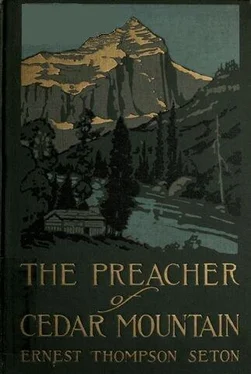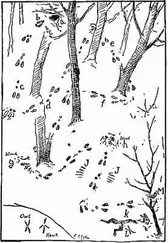Ernest Seton - The Preacher of Cedar Mountain
Здесь есть возможность читать онлайн «Ernest Seton - The Preacher of Cedar Mountain» весь текст электронной книги совершенно бесплатно (целиком полную версию без сокращений). В некоторых случаях можно слушать аудио, скачать через торрент в формате fb2 и присутствует краткое содержание. Год выпуска: 2009, Жанр: Прочие приключения, на английском языке. Описание произведения, (предисловие) а так же отзывы посетителей доступны на портале библиотеки ЛибКат.
- Название:The Preacher of Cedar Mountain
- Автор:
- Жанр:
- Год:2009
- ISBN:нет данных
- Рейтинг книги:3 / 5. Голосов: 1
-
Избранное:Добавить в избранное
- Отзывы:
-
Ваша оценка:
- 60
- 1
- 2
- 3
- 4
- 5
The Preacher of Cedar Mountain: краткое содержание, описание и аннотация
Предлагаем к чтению аннотацию, описание, краткое содержание или предисловие (зависит от того, что написал сам автор книги «The Preacher of Cedar Mountain»). Если вы не нашли необходимую информацию о книге — напишите в комментариях, мы постараемся отыскать её.
The Preacher of Cedar Mountain — читать онлайн бесплатно полную книгу (весь текст) целиком
Ниже представлен текст книги, разбитый по страницам. Система сохранения места последней прочитанной страницы, позволяет с удобством читать онлайн бесплатно книгу «The Preacher of Cedar Mountain», без необходимости каждый раз заново искать на чём Вы остановились. Поставьте закладку, и сможете в любой момент перейти на страницу, на которой закончили чтение.
Интервал:
Закладка:
Red Cloud was there calmly waiting with his counsellors and braves and the buckskin cayuse.
"Are you ready?" shouted Colonel Waller.
"Ho," said Red Cloud, and with an imperious wave of his hand he indicated "Go ahead!"
The light racing pad was put on Red Rover, the jockey mounted and rode him at a canter for a hundred yards and back, amid an outburst of applause as the splendid creature showed his pace. Then the groom approached and tightened the cinch.
The buckskin cayuse was brought to the front. Red Cloud made a gesture. A sixteen-year-old boy, armed with a quirt, appeared; an Indian gave him a leg up, and, naked to the breech clout on the naked horse, he sat like a statue. Jim got a strange thrill as he recognized him for the vigil-keeper of Cedar Mountain.
"Well," grumbled the Colonel, as he noted the jockey, "that's a twenty-five pound handicap on us, but I guess we can stand it." Yet, when they saw the two horses together, there was less disparity in size than they had supposed. But there was something about the buckskin that caught Hartigan's eye and made him remark: "It isn't going to be such a walk-over as our fellows think." And the trainer of Red Rover, as he noted the round barrel, clean limbs, and flaring nostrils of the buckskin, had for a moment just a guilty twinge as he recalled how lax he had been in the training after that run at Yellowbank Canyon.
But all was ready. The white men won the toss for choice and got the inside track; not that it mattered very much, except at the turn. The crowd was sent back to the lines, the riders held the racers to the scratch and, at a pistol crack, they bounded away.
Those that expected to see something spectacular at the start were disappointed. The English jockey leaned forward, touched Red Rover with his whip, and alongside the Indian boy on the buckskin did the very same thing. The Indian boy smiled and the Englishman responded, but in a superior way. He felt it was almost unfair to run against such a child, and in such a race, which wasn't a real race at all, in spite of the heavy stakes.
Thus they rode side by side at a good pace for half a mile, during which the buckskin drifted behind a little, now a length, now a length and a half. Next the copper-coloured jockey touched him up and, before the white man knew it, the bounding buckskin closed again and came right up, but now on the inside track. If the Englishman had not felt so confident, he would have stopped this well-known trick. It might not have been easy, since there were no lines or posts except the turning point, but it could have been prevented by deft man[oe]uvring. However, the Indian was now abreast on the inside and as the Englishman watched him he concluded that this child of nature was not so simple as he looked. He comforted himself with the thought that the other would need all he could get out of jockeying.
CHAPTER XXVIII
The Finish
The first mile was covered in good, but not remarkable time. Then they came to the turning point. There was just the chance of changing places here, for the inner horse had the disadvantage of the sharper turn, but the Indian boy made sure by dropping back a half length and the turn was made without a reverse. After them now with shouts of joy went all the mounted men who had been waiting and rode in a thundering charge, yelling and cheering. The white jockey knew now that he was not dealing with a fool. The red boy, though not so well mounted, was just as good a rider as himself, and twenty pounds lighter, besides being without leathers, which raised the handicap to fully twenty-five pounds. In that first half mile on the home stretch the buckskin still was head and neck behind. Then the riders put forth all their skill and each did his best to call forth every ounce of strength and every spurt of speed in his mount.
The Indian boy let off his native yell and cried: "Ho, Huya—Huya—Huya!" and the keen quirt flashed and the buckskin flew.
"Ho, Rover! good boy, git, git!" and the white man smote the shining flank; and both the noble brutes responded as they had not done before. The sense of play was gone. It was now the real and desperate race. The gazing thousands ranged about knew that, and the mingled roar of all their voices rose to a mighty booming sound.
"Ho, Rover! Run, boy, run!"
"Huya, Shunguna, Ho! Ho! Yeh! Yeh! Yeh!" and the redskin rider smote hard those heaving flanks.
Flash, flash, those shadowy hoofs; thud, thud, upon the plain; the buckskin's neck forged slowly on, now lapped the red-gold shoulder of his foe. The redskin shrieked, the riding mob behind gave voice and rode like madmen. The racers plunged and plunged, the riders lay down almost to their necks, plying their quirts and shouting words of urge.
The buckskin still won inches on the race, but the Rover led. The last, the final furlong was at hand. The riders yelled, the rabble yelled, guns were fired in mad excitement, and all restraint was gone. It was win—win—burst—die—but win ! And never jockeys harder rode and never horses better ran; the test was fair. Red Rover did his best, yet his rival's legs in that last spurt moved as a rabbit's legs, a maze of shadowy pounding limbs, and—sickening sight—the buckskin with the copper rider forged still more ahead—a neck, half a length ahead—and the race was won .
Peaches was in tears. "Colonel," he said, in a broken voice, "it was that twenty-five pound handicap did it; it wasn't fair."
The Colonel growled something about "a lot of fools to let up on the training after that Yellowbank trial."
Hartigan was standing near; gloomy, but not so gloomy as the rest; and when there came a chance to be heard, he said: "Colonel, once I see a horse close to, in fair daylight, I can always remember him afterward. I've been looking over their buckskin cayuse, and it's not the same one we raced in the Yellowbank."
The Colonel turned quickly around. "Are you sure?"
"Absolutely certain," was the answer.
"My goodness—you are right. I distrusted the whole business from the start. You are right; they fooled us on a stool-pigeon; this whole thing was a put-up job. The simple Red man!"
The "perchers" were gathered at the blacksmith shop next afternoon. "Well," said Shives, "I've done fifteen dollars' worth of work to-day and haven't taken in a cent." The audience grunted and he went on. "Every tap of it was for broken-down bums trying to get out of town—skinned by the simple Red man. Horses shod, tires set, bolts fixed, all kinds of cripplements. All they want is help to get out, get out; at any price get out. Well, it'll do you good, the whole caboodle of ye. Ye started out to do, and got done—everlastingly soaked." The blacksmith chuckled. "Serve you all right. I'm glad ye got it."
As Hartigan appeared, swinging a big stick and singing "The Wearing of the Green," Shives asked: "Well, Jim, how much did you lose?"
"Nothing," sang Hartigan cheerfully; "I don't bet"; and he went on singing, "'Tis the most distressful country this that ever yet was seen."
"Lucky dog! All the sports round this neck o' the woods are ruined. They say no gentleman will bet on a sure thing. H'm, maybe not. Well, fellows, cheer up; no man ever yet was made, until he had been ruined a couple of times; and all I hope is that the Reds will get up another race and soak ye to the limit. Then maybe some o' ye will brace up and be men; but I dunno."
"Guess they've soaked us to the limit now," was the general voice of those assembled.
Poor Higginbotham had gone in rather strong for him, in spite of his wife, and there was no blue sky in his world, or prospect of it.
Then they turned on Hartigan, who was going through the movements of singlestick, on the open floor. "Was he white, or wasn't he? How could he stand by and see the whole settlement skinned alive by Red Injins when he had the game in his own hands? Why didn't he enter Blazing Star? He didn't seem to take much interest in the affair, probably he wanted the Red skins to win." The jibe stung Jim to the quick; he ceased his exuberant exercise; the song died on his lips, and he strode away in silence.
Читать дальшеИнтервал:
Закладка:
Похожие книги на «The Preacher of Cedar Mountain»
Представляем Вашему вниманию похожие книги на «The Preacher of Cedar Mountain» списком для выбора. Мы отобрали схожую по названию и смыслу литературу в надежде предоставить читателям больше вариантов отыскать новые, интересные, ещё непрочитанные произведения.
Обсуждение, отзывы о книге «The Preacher of Cedar Mountain» и просто собственные мнения читателей. Оставьте ваши комментарии, напишите, что Вы думаете о произведении, его смысле или главных героях. Укажите что конкретно понравилось, а что нет, и почему Вы так считаете.




